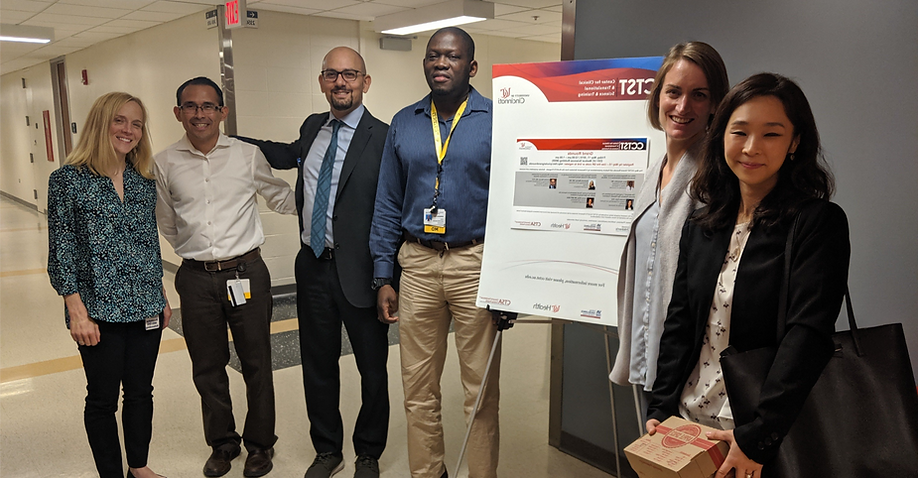

K SCHOLARS CAREER DEVELOPMENT AWARD PROGRAM
Application Information | Early-Career Faculty Resources | K Award College | Current Scholars | News | Scholar Graduates | K Scholars Team
K SCHOLARS CAREER DEVELOPMENT AWARD PROGRAM
Funded by a National Institutes of Health (NIH) Clinical & Translational Science Award (CTSA), the CCTST K Scholars Program is an institutional K award program that is focused on developing cohorts of exceptional early career investigators from a broad range of disciplines and across the academic health system who aspire to lead clinical and translational programs of research that align with the mission of the NIH National Center for Advancing Translational Sciences (NCATS).

Focused on early career MD/DO or PhD faculty, the K Scholars Program serves as a mentored training step leading to the first submission of a NIH career development grant such as a K01, K08, K23 or their equivalents. Alternately, early career faculty applicants who would like to use the K Scholar program as a mentored K-step in preparation for a first submission of an R-level award are also welcome.
The K Scholars program is awarded two NIH K12 positions per year. To expand the reach of the program, our CCTST institutions fund two additional Clinical and Translational Scholars (“CT2”) for whom programming is similar. Together, the K12 and CT2 Scholars are called K Scholars. K Scholars will develop skills towards sustainable and impactful research careers in translational science aimed at improving health outcomes for all people and communities.
Key aspects of the program include:
-
75% salary support (up to $113,500) and $26,700 in research support per year for two consecutive years for completion of a mentored research project and associated training and travel.
-
Tailored and experiential learning opportunities (e.g. implementation science, community-engaged research methods, team science).
-
K Scholar meetings that include work in progress (WIP) sessions in which Scholars rotate presenting and receiving feedback on their K Scholar project, specific aims for new grants, manuscript development, or conference presentations. Additional didactics and professional development programming include program alumni and cross-institutional faculty. Peer mentoring is integral to our program, a highly endorsed attribute of our Scholars’ success.
-
To ensure that all Scholars have, or develop, competency in key areas of translational research, Scholars are required to complete a series of courses either prior to or during their award period.
-
Opportunities for networking and disseminating your work at a regional and national level via ACTS meeting and scholars at other CTSA hubs.
-
Scholars have an opportunity for externships with outside organizations, such as a pharmaceutical company, clinical research organization, or another CTSA institution.
Program Expectations
Applicants identify a translational mentoring team, led by a primary mentor who meets the mentor requirements outlined in the annual RFA. This team will include a minimum of two additional research mentors, one with a clinical background.
During the K Scholar award period, Scholars are expected to submit either an NIH K- or R-level award. The applicant’s home division or department must guarantee a 3rd year of 75% protected time in the event that the Scholar has applied for but not yet received independent research grant support by the end of the 2nd year of K Scholar support.
APPLICATION INFORMATION
Important Dates
Application Details
-
Additional resources:
Eligibility
-
Applicants must have a full-time faculty appointment at the rank of instructor or assistant professor at the University of Cincinnati, Cincinnati Children’s Hospital, or the Cincinnati Veterans Affairs Medical Center.
-
Post-doctoral fellows (MD or PhD) may apply, however they will need to submit a letter at the LOI submission phase from their department or division stating when they are expected to be faculty and that the appointment is prior to and not contingent upon the receipt of this award.
-
-
Applicants must have a research or health-professional doctoral degree or its equivalent.
-
Applicants must be a United States Citizen or non-citizen national or have legal admission into the United States as a permanent citizen at the time of LOI submission.
-
NOTE: Currently, applicants who are proposing a clinical trial for their K Scholar project (using NIH definitions) are only eligible to be appointed as a CT2 (institutionally funded) Scholar. They cannot be given a K12 spot.
-
However, any applicant may propose a future clinical trial as part of their “next step” application (e.g. NIH K, R01) and incorporate trainings and mentorship as part of their K Scholar career development plan to inform that future clinical trial.
-
Additional restrictions apply; see RFA for eligibility guidelines.
-
EARLY-CAREER FACULTY RESOURCES
Beyond supporting scholars in our program, we are committed to providing resources for all trainees and early-career faculty. We promote valuable cross-institutional opportunities, resources, and training to help elevate their academic journey.
RISE - Research Initiatives Supporting Early-Career Scholars Newsletter
RISE is a bi-weekly e-newsletter open to all trainees and early-career faculty promoting valuable cross-institutional resources, career development opportunities and trainings.

Check out the latest edition of RISE: February 4, 2026
If you are interested in receiving the RISE newsletter, please contact Emma Jones to be added to the listserv.
K Award College
Annual ten-week seminar overview of topics related to writing career development awards led by mentors, awardees, and program directors of K awards. Please click here to learn more about K Award College.
SCHOLAR SUCCESSES
94% of K Scholar graduates are conducting clinical & translational research
1,542 manuscripts generated
80% of graduates have served as PI of a federal K or R level grant
CURRENT SCHOLARS
K SCHOLAR NEWS
SCHOLAR GRADUATES
Click on the images below to see what the Scholars are up to now.


















